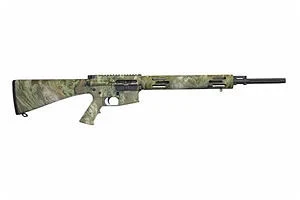Bushmaster Max 1 Predator vs Lithgow Small Arms Lee-Enfield Mk III
Put rifles head to head to compare caliber and more.
|
$1041.00
|
vs |
$0.00
|
| Rifles | Bushmaster Max 1 Predator | Lithgow Small Arms Lee-Enfield Mk III |
|---|---|---|
| Summary | ||
| Rating | ||
| Rank | ||
| Weight | 120 oz | |
| Action | Semi-Automatic | |
| Caliber | .223 Remington | .303 British |
| Capacity | 5+1 | 17+1 |
| Finish | Camo, Blue Barrel | Black |
| Gun Type | Rifle | |
| Sights | No Sights | Adjustable w/ Tritium Front Post & 2-Dot Tritium Rear Aperture |
| Barrel Length | 25" | |
| Details | ||
| Brand | Bushmaster | |
| Reviews | See 2 Reviews | N/A |
| Prices | ||
| MSRP | $1,015.00 | $0.00 |
| Used Price | $710.50 | $0.00 |
| Sale Price | $913.50 | $0.00 |
Rifles Descriptions
Bushmaster Max 1 Predator
Built as a result of numerous requests by the hunters who wanted a slightly shorter barrel and lighter swing weight in a carry rifle for predator hunting/calling, this 20� barreled version of the Varminter will deliver all the accuracy you�ve come to expect from a Bushmaster.
Lithgow Small Arms Lee-Enfield Mk III
The Lee Enfield MkIII, known as the 'three-O-three' was manufactured in the United Kingdom by the Royal Small Arms Factory at Enfield, Birmingham Small Arms (BSA Co) and London Small Arms (LSA Co) and by the Ishapore Arsenal in India. In Australia it was made by Lithgow Small Arms Factory from 1907 to 1953. Lithgow Small Arms Factory is a military small arms factory located in the town of Lithgow, New South Wales in Australia. SMLE No.1 MkIII was also the first weapon produced at the Lithgow Small Arms Factory. Approved in January 1907, this short rifle superseded the Long Lee Enfield and featured a number of improvements over previous Marks in respect to simplified manufacture and battle efficiency. The barrel is 25.2 inches (640mm) long and the rifling has 5 grooves and a left hand twist. The overall length is 44.5 inches (1130mm) and the rifle weight is 8lb 10oz (3.9kg). Magazine capacity is 10 rounds. The accompanying Pattern 07 bayonet was also produced at Lithgow commencing in 1913 with the hooked quillon model. In 1915 the hook was discontinued and large numbers of the early bayonets had the hook removed to comply with the new specifications.



